Analyzing Depression: Exploring Causes from Psychological Perspectives
VerifiedAdded on 2023/06/14
|10
|734
|441
Report
AI Summary
This report explores the causes of depression from three key psychological perspectives: cognitive, biological, and psychodynamic. The cognitive perspective, drawing on the theories of Albert Ellis and Aaron Beck, highlights the role of irrational and negative thinking in depression. The biological perspective focuses on genetic, hormonal, and neurochemical factors that contribute to the illness, particularly the loss of neuroplasticity. The psychodynamic perspective examines the impact of unconscious forces and interactions within the personality. The report concludes by noting the availability of therapies such as psychoanalysis and cognitive behavioral therapy to help individuals cope with depression.

TASK 2
Paraphrase This Document
Need a fresh take? Get an instant paraphrase of this document with our AI Paraphraser
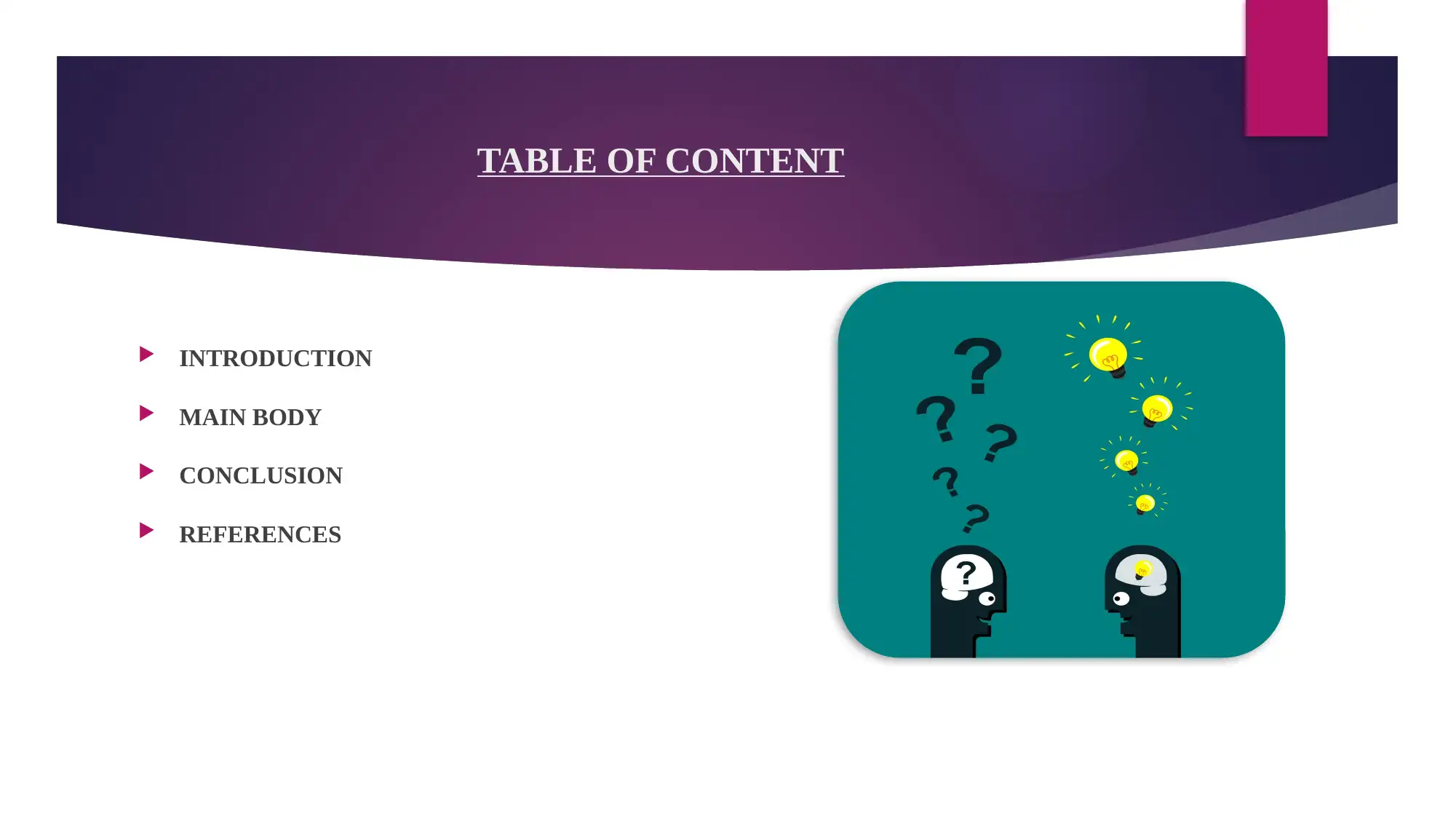
TABLE OF CONTENT
INTRODUCTION
MAIN BODY
CONCLUSION
REFERENCES
INTRODUCTION
MAIN BODY
CONCLUSION
REFERENCES
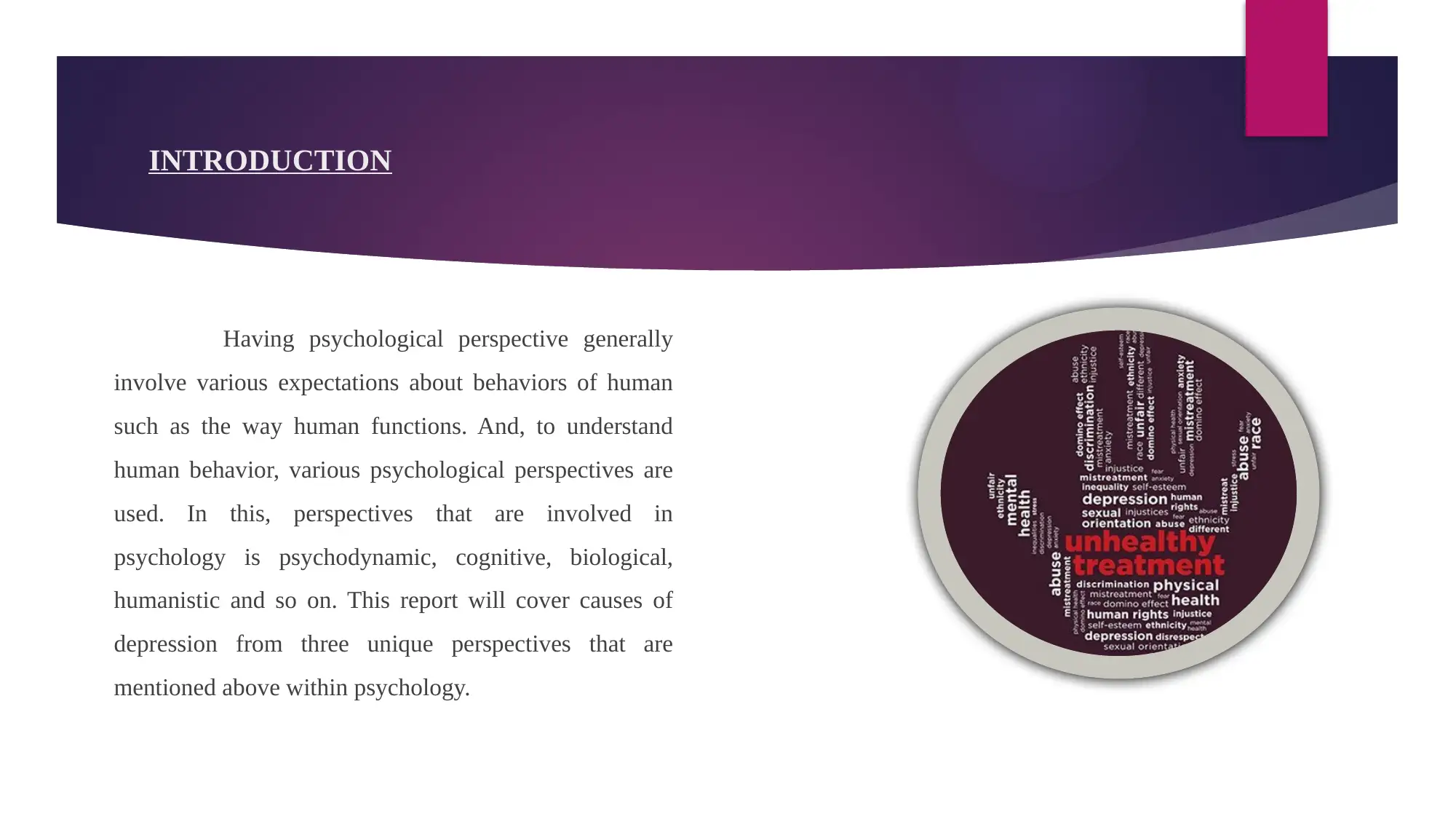
INTRODUCTION
Having psychological perspective generally
involve various expectations about behaviors of human
such as the way human functions. And, to understand
human behavior, various psychological perspectives are
used. In this, perspectives that are involved in
psychology is psychodynamic, cognitive, biological,
humanistic and so on. This report will cover causes of
depression from three unique perspectives that are
mentioned above within psychology.
Having psychological perspective generally
involve various expectations about behaviors of human
such as the way human functions. And, to understand
human behavior, various psychological perspectives are
used. In this, perspectives that are involved in
psychology is psychodynamic, cognitive, biological,
humanistic and so on. This report will cover causes of
depression from three unique perspectives that are
mentioned above within psychology.
⊘ This is a preview!⊘
Do you want full access?
Subscribe today to unlock all pages.

Trusted by 1+ million students worldwide
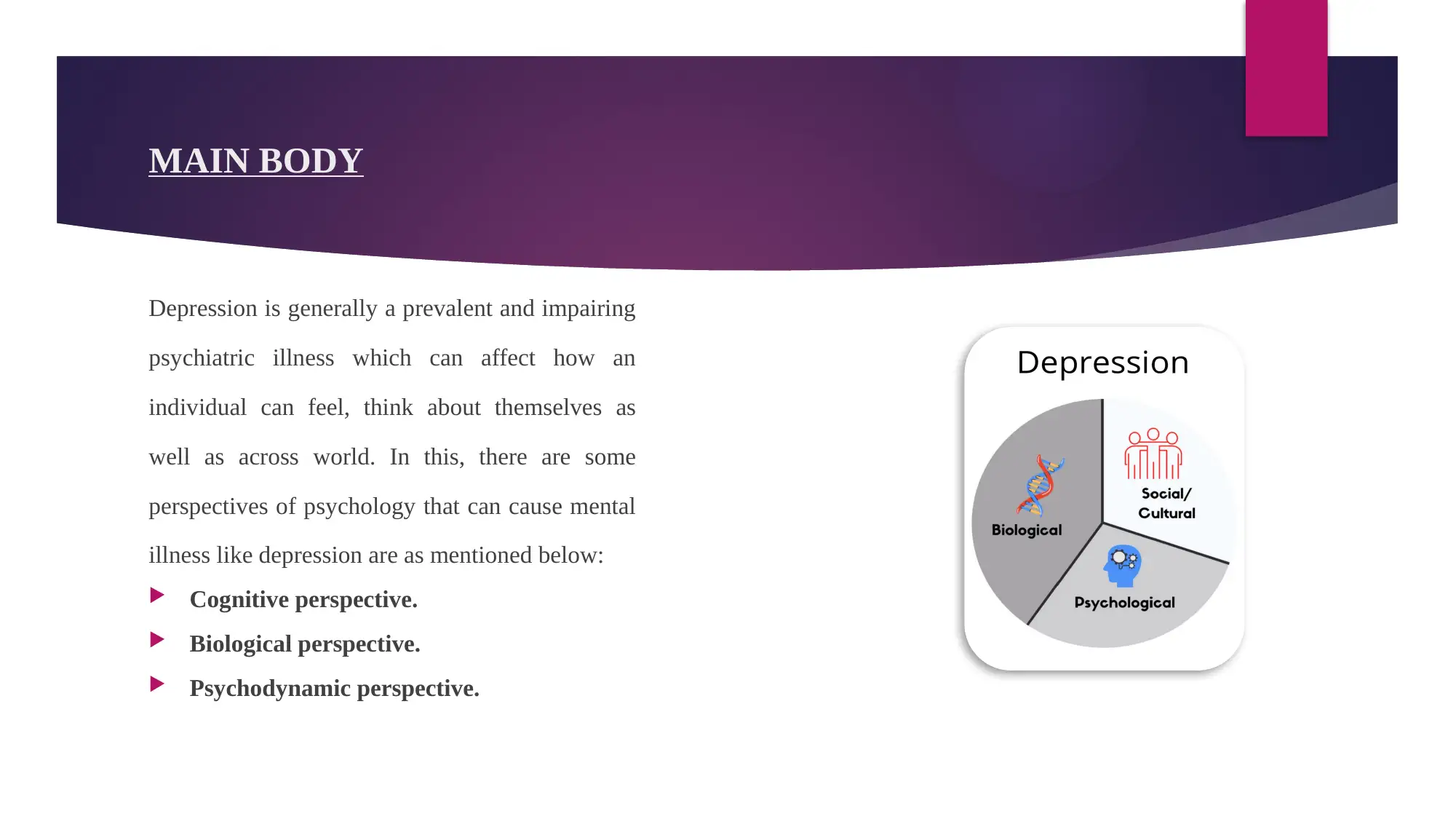
MAIN BODY
Depression is generally a prevalent and impairing
psychiatric illness which can affect how an
individual can feel, think about themselves as
well as across world. In this, there are some
perspectives of psychology that can cause mental
illness like depression are as mentioned below:
Cognitive perspective.
Biological perspective.
Psychodynamic perspective.
Depression is generally a prevalent and impairing
psychiatric illness which can affect how an
individual can feel, think about themselves as
well as across world. In this, there are some
perspectives of psychology that can cause mental
illness like depression are as mentioned below:
Cognitive perspective.
Biological perspective.
Psychodynamic perspective.
Paraphrase This Document
Need a fresh take? Get an instant paraphrase of this document with our AI Paraphraser
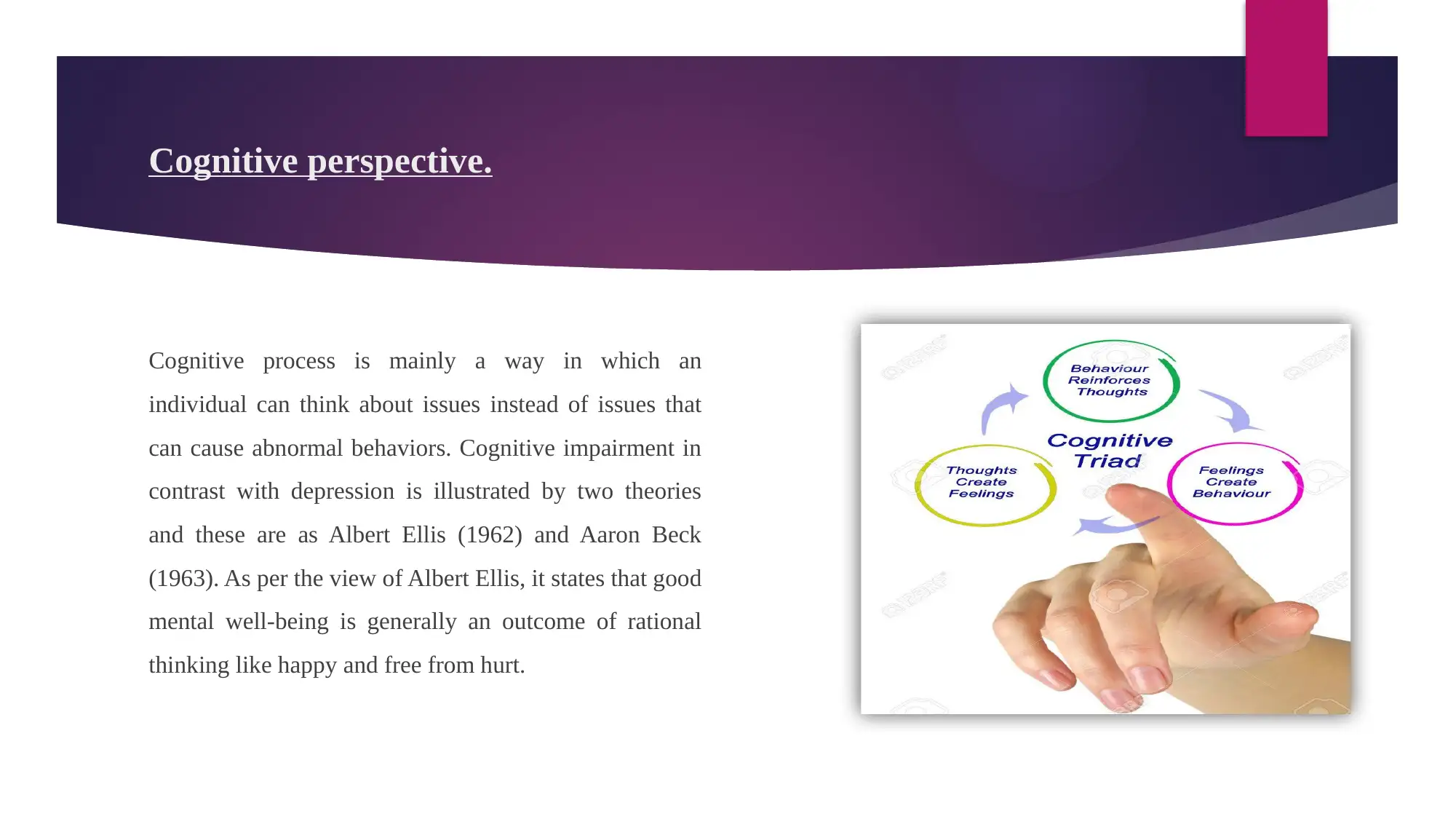
Cognitive perspective.
Cognitive process is mainly a way in which an
individual can think about issues instead of issues that
can cause abnormal behaviors. Cognitive impairment in
contrast with depression is illustrated by two theories
and these are as Albert Ellis (1962) and Aaron Beck
(1963). As per the view of Albert Ellis, it states that good
mental well-being is generally an outcome of rational
thinking like happy and free from hurt.
Cognitive process is mainly a way in which an
individual can think about issues instead of issues that
can cause abnormal behaviors. Cognitive impairment in
contrast with depression is illustrated by two theories
and these are as Albert Ellis (1962) and Aaron Beck
(1963). As per the view of Albert Ellis, it states that good
mental well-being is generally an outcome of rational
thinking like happy and free from hurt.
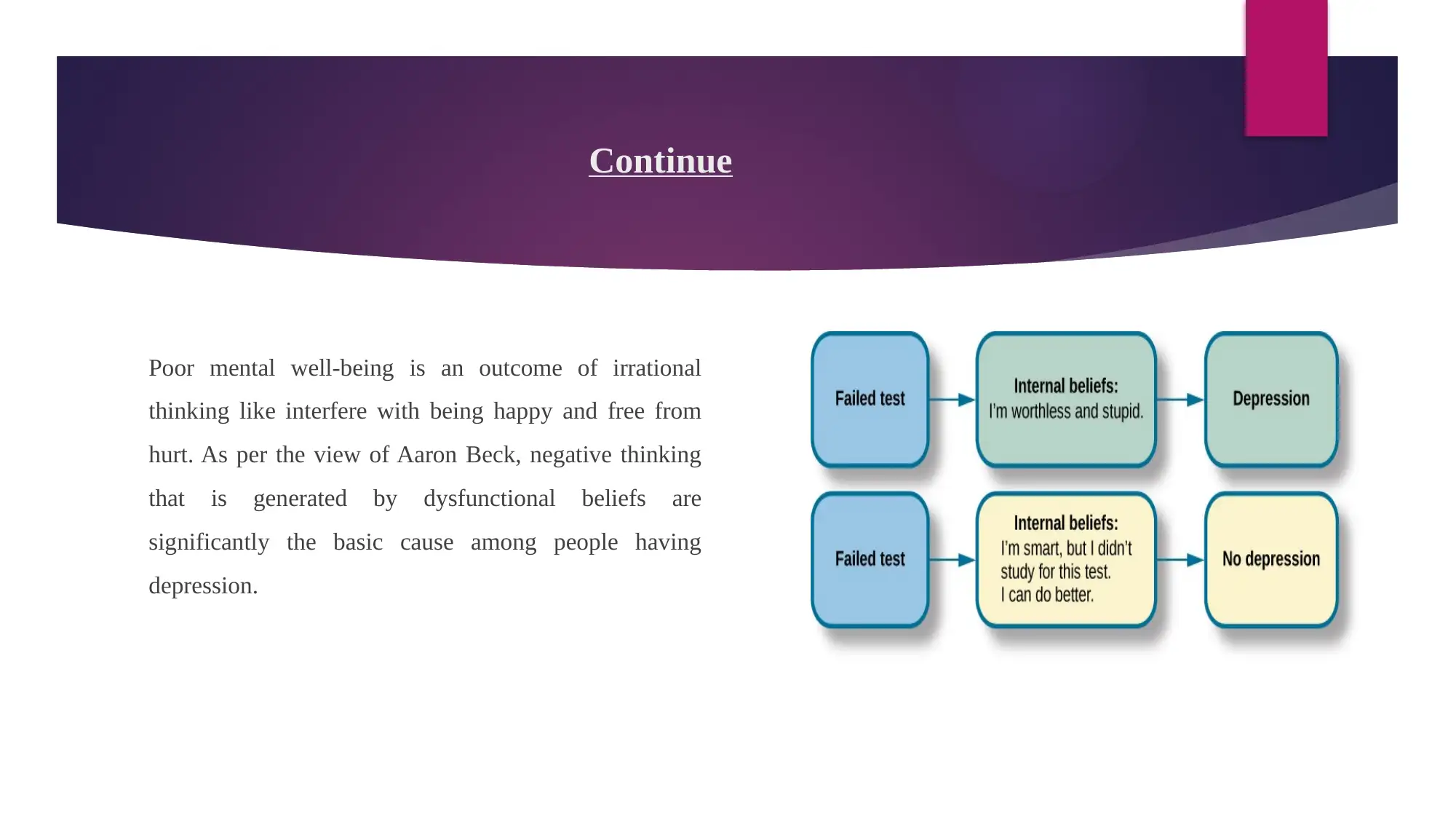
Continue
Poor mental well-being is an outcome of irrational
thinking like interfere with being happy and free from
hurt. As per the view of Aaron Beck, negative thinking
that is generated by dysfunctional beliefs are
significantly the basic cause among people having
depression.
Poor mental well-being is an outcome of irrational
thinking like interfere with being happy and free from
hurt. As per the view of Aaron Beck, negative thinking
that is generated by dysfunctional beliefs are
significantly the basic cause among people having
depression.
⊘ This is a preview!⊘
Do you want full access?
Subscribe today to unlock all pages.

Trusted by 1+ million students worldwide
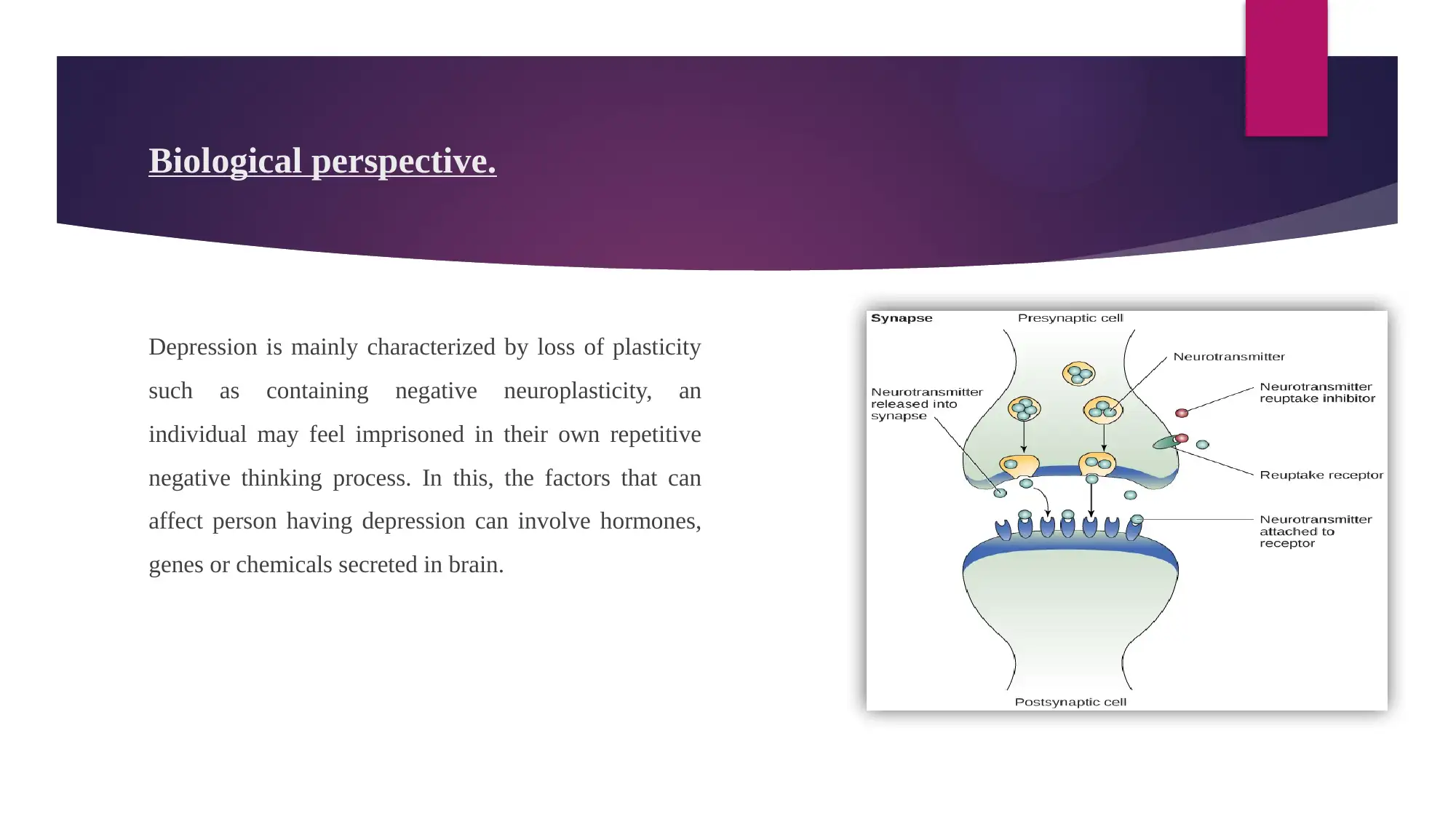
Biological perspective.
Depression is mainly characterized by loss of plasticity
such as containing negative neuroplasticity, an
individual may feel imprisoned in their own repetitive
negative thinking process. In this, the factors that can
affect person having depression can involve hormones,
genes or chemicals secreted in brain.
Depression is mainly characterized by loss of plasticity
such as containing negative neuroplasticity, an
individual may feel imprisoned in their own repetitive
negative thinking process. In this, the factors that can
affect person having depression can involve hormones,
genes or chemicals secreted in brain.
Paraphrase This Document
Need a fresh take? Get an instant paraphrase of this document with our AI Paraphraser
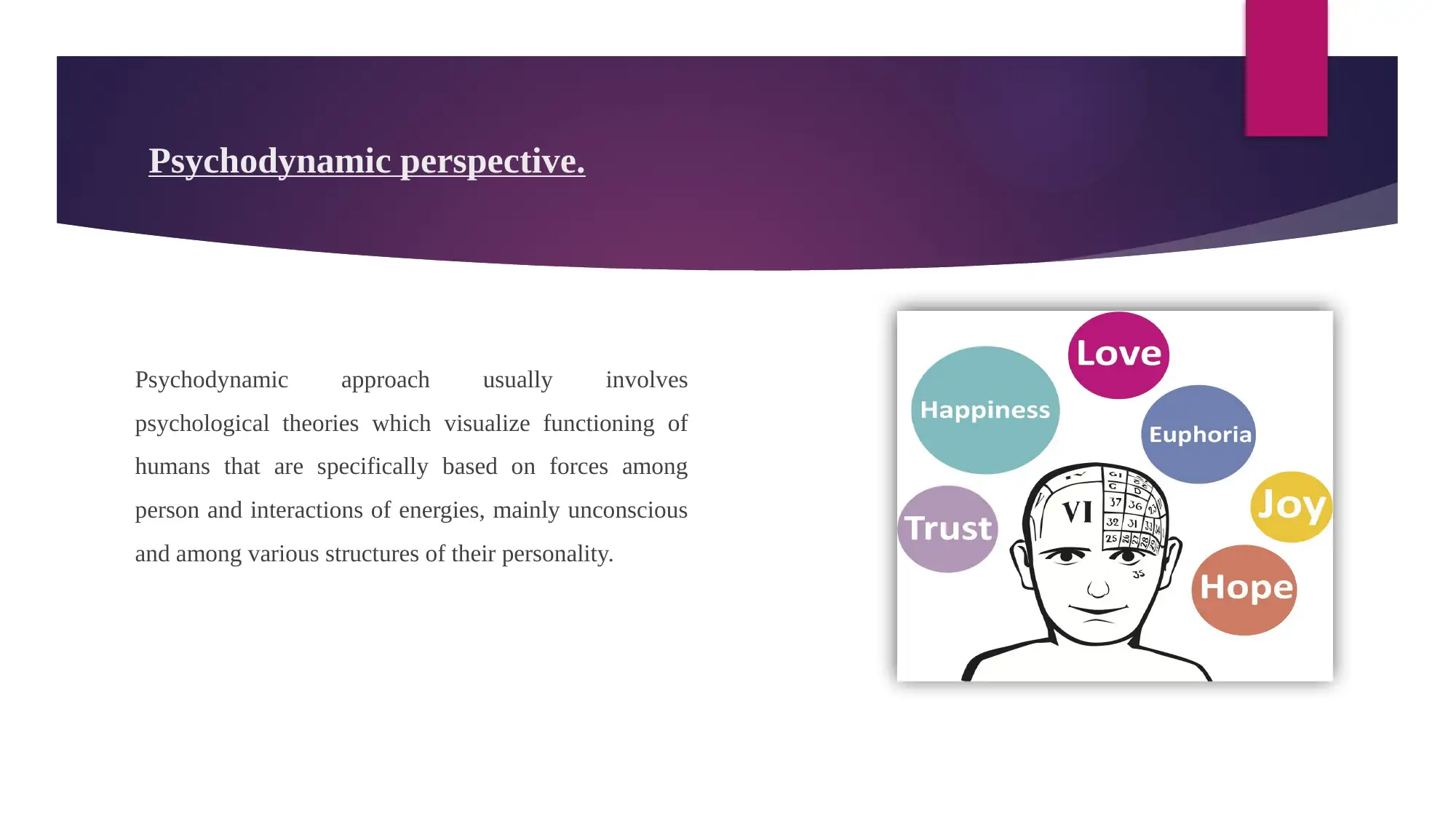
Psychodynamic perspective.
Psychodynamic approach usually involves
psychological theories which visualize functioning of
humans that are specifically based on forces among
person and interactions of energies, mainly unconscious
and among various structures of their personality.
Psychodynamic approach usually involves
psychological theories which visualize functioning of
humans that are specifically based on forces among
person and interactions of energies, mainly unconscious
and among various structures of their personality.
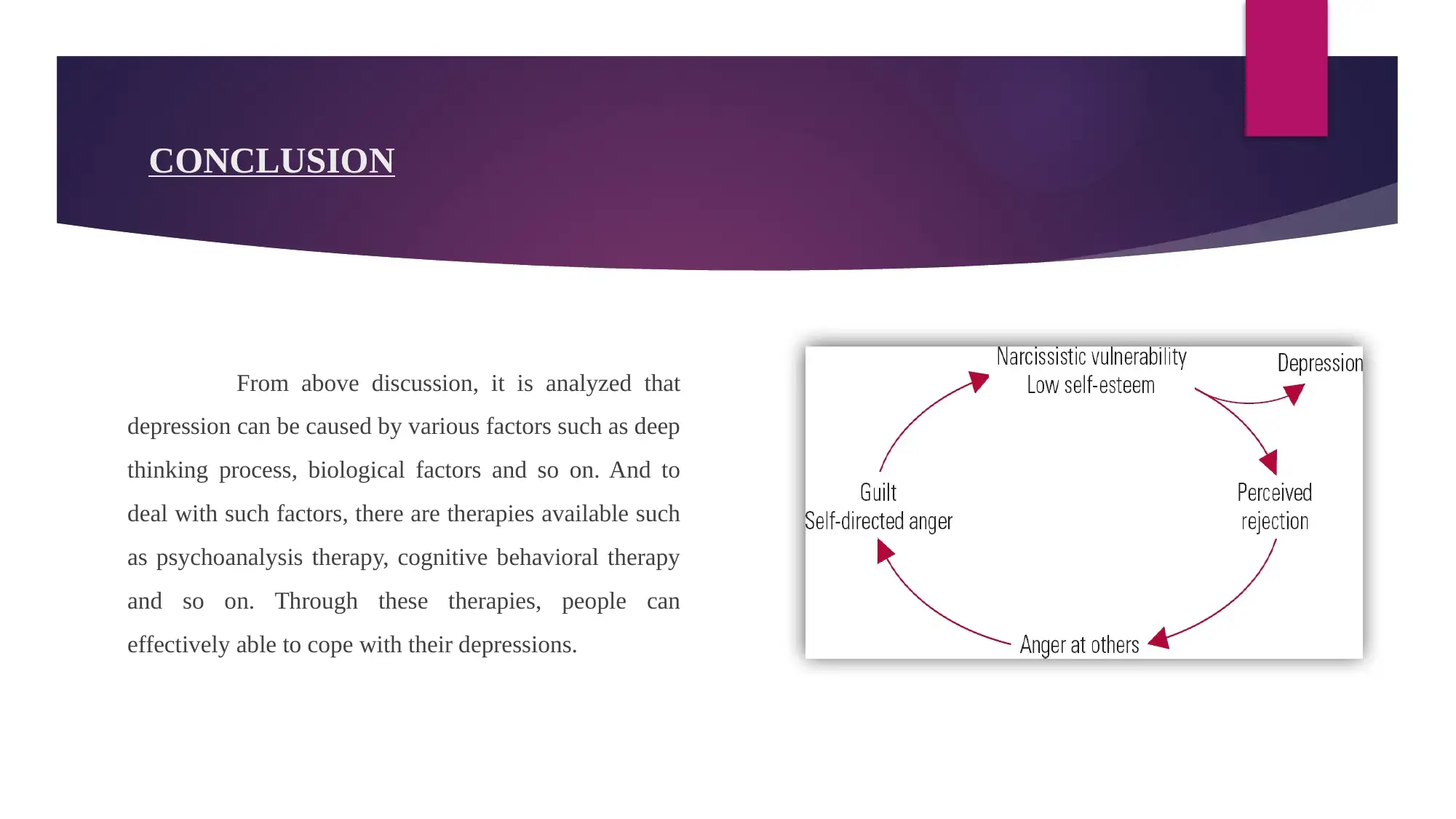
CONCLUSION
From above discussion, it is analyzed that
depression can be caused by various factors such as deep
thinking process, biological factors and so on. And to
deal with such factors, there are therapies available such
as psychoanalysis therapy, cognitive behavioral therapy
and so on. Through these therapies, people can
effectively able to cope with their depressions.
From above discussion, it is analyzed that
depression can be caused by various factors such as deep
thinking process, biological factors and so on. And to
deal with such factors, there are therapies available such
as psychoanalysis therapy, cognitive behavioral therapy
and so on. Through these therapies, people can
effectively able to cope with their depressions.
⊘ This is a preview!⊘
Do you want full access?
Subscribe today to unlock all pages.

Trusted by 1+ million students worldwide
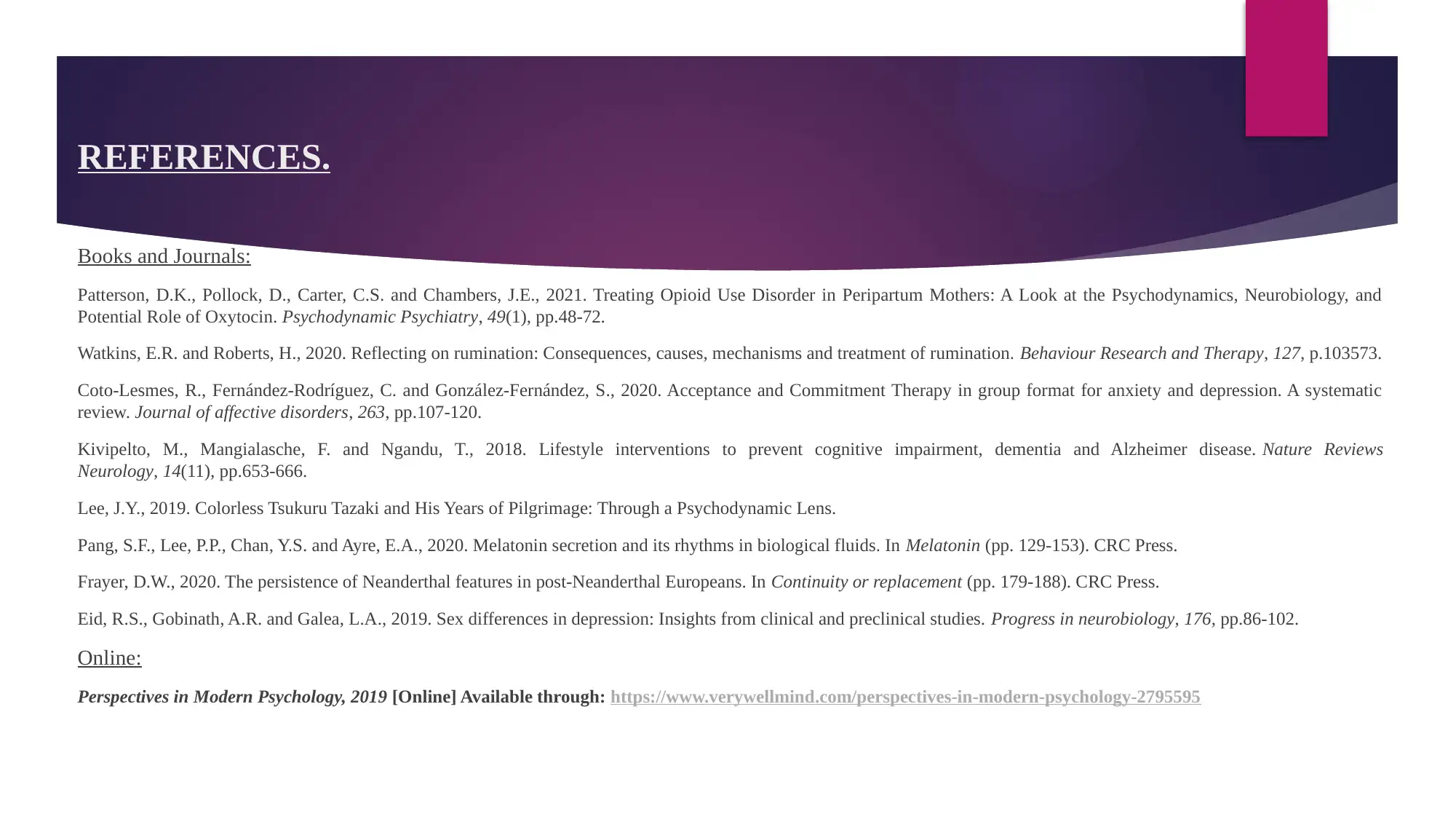
REFERENCES.
Books and Journals:
Patterson, D.K., Pollock, D., Carter, C.S. and Chambers, J.E., 2021. Treating Opioid Use Disorder in Peripartum Mothers: A Look at the Psychodynamics, Neurobiology, and
Potential Role of Oxytocin. Psychodynamic Psychiatry, 49(1), pp.48-72.
Watkins, E.R. and Roberts, H., 2020. Reflecting on rumination: Consequences, causes, mechanisms and treatment of rumination. Behaviour Research and Therapy, 127, p.103573.
Coto-Lesmes, R., Fernández-Rodríguez, C. and González-Fernández, S., 2020. Acceptance and Commitment Therapy in group format for anxiety and depression. A systematic
review. Journal of affective disorders, 263, pp.107-120.
Kivipelto, M., Mangialasche, F. and Ngandu, T., 2018. Lifestyle interventions to prevent cognitive impairment, dementia and Alzheimer disease. Nature Reviews
Neurology, 14(11), pp.653-666.
Lee, J.Y., 2019. Colorless Tsukuru Tazaki and His Years of Pilgrimage: Through a Psychodynamic Lens.
Pang, S.F., Lee, P.P., Chan, Y.S. and Ayre, E.A., 2020. Melatonin secretion and its rhythms in biological fluids. In Melatonin (pp. 129-153). CRC Press.
Frayer, D.W., 2020. The persistence of Neanderthal features in post-Neanderthal Europeans. In Continuity or replacement (pp. 179-188). CRC Press.
Eid, R.S., Gobinath, A.R. and Galea, L.A., 2019. Sex differences in depression: Insights from clinical and preclinical studies. Progress in neurobiology, 176, pp.86-102.
Online:
Perspectives in Modern Psychology, 2019 [Online] Available through: https://www.verywellmind.com/perspectives-in-modern-psychology-2795595
Books and Journals:
Patterson, D.K., Pollock, D., Carter, C.S. and Chambers, J.E., 2021. Treating Opioid Use Disorder in Peripartum Mothers: A Look at the Psychodynamics, Neurobiology, and
Potential Role of Oxytocin. Psychodynamic Psychiatry, 49(1), pp.48-72.
Watkins, E.R. and Roberts, H., 2020. Reflecting on rumination: Consequences, causes, mechanisms and treatment of rumination. Behaviour Research and Therapy, 127, p.103573.
Coto-Lesmes, R., Fernández-Rodríguez, C. and González-Fernández, S., 2020. Acceptance and Commitment Therapy in group format for anxiety and depression. A systematic
review. Journal of affective disorders, 263, pp.107-120.
Kivipelto, M., Mangialasche, F. and Ngandu, T., 2018. Lifestyle interventions to prevent cognitive impairment, dementia and Alzheimer disease. Nature Reviews
Neurology, 14(11), pp.653-666.
Lee, J.Y., 2019. Colorless Tsukuru Tazaki and His Years of Pilgrimage: Through a Psychodynamic Lens.
Pang, S.F., Lee, P.P., Chan, Y.S. and Ayre, E.A., 2020. Melatonin secretion and its rhythms in biological fluids. In Melatonin (pp. 129-153). CRC Press.
Frayer, D.W., 2020. The persistence of Neanderthal features in post-Neanderthal Europeans. In Continuity or replacement (pp. 179-188). CRC Press.
Eid, R.S., Gobinath, A.R. and Galea, L.A., 2019. Sex differences in depression: Insights from clinical and preclinical studies. Progress in neurobiology, 176, pp.86-102.
Online:
Perspectives in Modern Psychology, 2019 [Online] Available through: https://www.verywellmind.com/perspectives-in-modern-psychology-2795595
1 out of 10
Related Documents
Your All-in-One AI-Powered Toolkit for Academic Success.
+13062052269
info@desklib.com
Available 24*7 on WhatsApp / Email
![[object Object]](/_next/static/media/star-bottom.7253800d.svg)
Unlock your academic potential
Copyright © 2020–2026 A2Z Services. All Rights Reserved. Developed and managed by ZUCOL.





